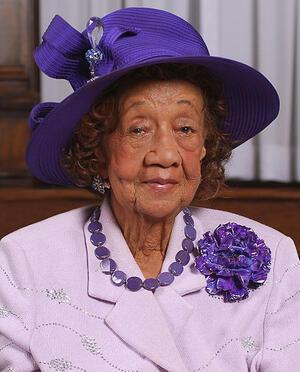Dorothy Height, Honorary Jewess with Attitude
Like countless other Americans, here at the Jewish Women's Archive we were great admirers of Dorothy Height, who died on April 20 at the age of 98 and is being buried in Washington, DC today. Given what we know about Dr. Height, we couldn’t help but be struck by President Obama’s statement that "the godmother of the civil rights movement" had “served as the only woman at the highest level of the civil rights movement, witnessing [italics added] every march and milestone along the way."
Dorothy Height did so much more than witness the struggles and successes of the civil rights movement. As the New York Times said, “over the years, historians have made much of the so-called ‘Big Six’ who led the civil rights movement: the Rev. Dr. Martin Luther King Jr., James Farmer, John Lewis, A. Philip Randolph, Roy Wilkins and Whitney M. Young Jr. The paper notes that Height was “the only woman to work regularly alongside them on projects of national significance”; she was “very much the unheralded seventh, the leader who was cropped out, figuratively and often literally, of images of the era. [italics added again]
Dorothy Height ran the Council of Negro Women for four decades. She did not die unheralded. The President of the United States gave the eulogy at her funeral this morning. Her story was not un-told, and yet she has mostly been remembered as the woman “who marched alongside Martin Luther King, Jr.,” who sat beside him on the platform at the March on Washington. [my italics].
Holly Cowan Shulman knew Height well through her mother Polly Cowan, a Jewish woman who, together with Height, ran “Wednesdays in Mississippi” a little known but important civil rights project. Shulman wrote in the Huffington Post that “the men, while respecting her, made sure that they kept the public eye on themselves, with Dorothy Height only appearing at the very edge of the photo op, consigned to the Siberia of public relations. In the 1960s few men questioned whose leadership was more valuable, a man's or a woman's. In today's language we would call her role ‘gendered.’ As Dr. Height herself recognized, the men valued her for her ability to bring them together, to resolve disputes and bridge gaps.”
Perhaps she didn’t mind. An article on Afro.com quoted from her oral history: "In terms of the working relationship, I had great respect for those men. I felt that we were a group of peers. I felt at home in that group. I never felt I needed to fight as a woman."
However, she was always willing to fight for women’s issues. Maudine Cooper, president of the Greater Washington Urban League, said, “She was the only woman amongst the civil rights leaders. I know it was a tough place to be, but she held her own. And she made sure that they not only talked about civil rights, but they also talked about women’s rights." As Bill Fletcher, Jr., editor of Black Commentator, told GRITtv, “Through force of personality alone she in many respects united the black freedom movement and feminist movement.” He recognized her enormous contributions to civil rights but pointed out that “this was also someone who was a feminist, someone who was an outspoken advocate for women, gays, lesbians, transgendered people. This was not someone who could be pigeonholed.”







Apropos of Ellen's post, I was suprised to see that President Obama also made a Jewess with Attitude reference when he characterized Dorothy Height as "Queen Esther to this Moses Generation."
I've thought a lot about Height in recent months while working on our forthcoming Living the Legacy civil rights curriculum, and on the Wednesdays in Mississippi (WIMS) lesson in particular. The WIMS stories were not among the stories I knew about the Civil Rights Movement before beginning work on this project, and I am interested to see if the mentions of WIMS in Obama's eulogy and other tributes will lead to greater awareness for the organizing these women did.
Today the pictures of and references to Height's hats also brought to mind for me yet another Jewess with Attitude, Bella Abzug. I found it all the more fitting that Abzug too is paired with Queen Esther here, in our Go & Learn on costumes, leadership, and identity.